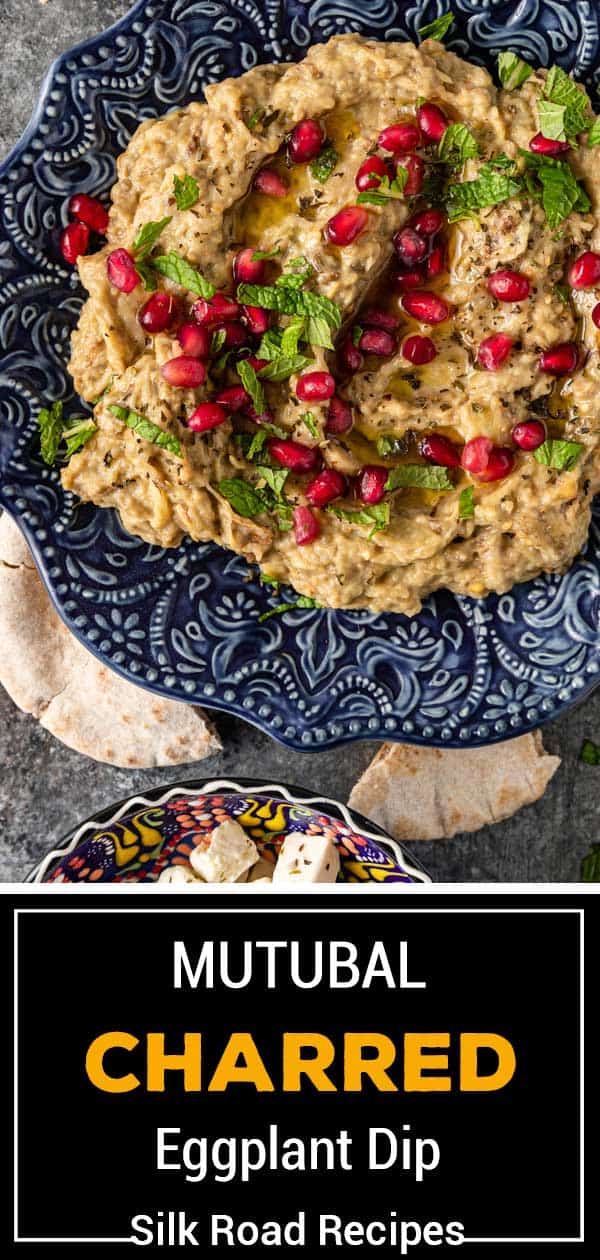published Jan 02, 2023 If you are a fan of Middle Eastern cuisine, you’re going to love today’s recipe. Mutabal is a charred eggplant dip with an intoxicatingly smoky flavor and silky smooth texture. We use garlic, lemon juice and cumin in this recipe. Some versions include different herbs and spices, or even yogurt. Different regions use alternate spellings too, including m’tabbal, mutabel, or moutabel. No matter the spelling, mutabal is a delicious way to use eggplant. It can be a tricky ingredient to work with so I’m always excited to find and share new ways of enjoying it. If you are looking for a bit more eggplant inspiration, check out my Zaalouk (Eggplant Appetizer), Spiced Eggplant Stew, or Eggplant Moussaka.
Difference between Baba Ganoush and Mutabal
Both dips start with a base of roasted eggplant (smoked aubergine), but the rest of the ingredients differ. Mutabal is fairly simple, typically blending the vegetable with tahini, garlic, and olive oil. Instead, Baba ganoush includes more complex flavors from onions, tomatoes, pomegranate molasses, fresh herbs and no tahini. Personally, I often see recipes called baba ganoush that are truly mutabal!
INGREDIENT NOTES AND SUBSTITUTIONS
Eggplant – This mild, slightly bitter vegetable forms the tender, creamy base of the recipe. One eggplant will yield about one pound of cooked flesh. Garlic – Zesty and pungent, garlic brings the dip to life. Lemon Juice – Adds bright, sour, and lively notes. Tahini – This satiny smooth puree of sesame seeds gives the dish its exceptional texture. Look for it in the peanut butter aisle. Salt – Enhances flavor and offsets the bitterness of the eggplant. Cumin – Adds just the right touch of smoky warmth.Pomegranate Seeds – Add a burst of sweet, sour, and astringent flavor and a dash of color. Mint – Adds a pop of cool, slightly sweet flavor and a lovely splash of color. Parsley – Herbaceous and mildly peppery, parsley is more than just a garnish. Olive Oil – You can use vegetable or avocado oil instead for roasting the eggplant. However, opt for high-quality olive oil to drizzle over the dip.
Video: Making Mutabbal
Want to see how easy this appetizer is to make? Just watch the recipe video located in the recipe card at the bottom of this post!
HOW TO MAKE MUTABAL
Recipe notes
Storage – Keep in an airtight container in the refrigerator for up to 3 days.Freezing – It is possible to freeze the dip, but there may be a slight difference in texture. Let it chill in the refrigerator first, then freeze for up to 3 months. Thaw and then stir or blend again before serving.Using a food processor – It helps to pulse the dip instead of using a constant blend to achieve the right texture. Feel free to blend until completely smooth if you’d like, but the flavors are better when there are still some chunks of eggplant.
How to Serve Mutabal
The dip is most often served with fresh vegetables and khubz (pita) or Armenian flatbread. But there are plenty of other ways to use it, and here are just a few:
With grilled chicken or koobideh kabobSpread on sandwiches and wrapsAs part of a mezze table
Is Mutabal the Same as Baba Ganoush?
Both of these classic dips start with a base of roasted eggplant with a few key differences. Mutabal is a fairly simple combination of eggplant, tahini, olive oil, garlic and varying spices. Baba Ganoush, on the other hand, contains no tahini and tends to be more complex, boasting the flavors of pomegranate molasses, tomatoes, onions, and fresh herbs.
Should Mutabal Be Served Hot or Cold?
This versatile eggplant dip is traditionally served cold or at room temperature, but it is perfectly okay to enjoy it while it is still a bit warm. Serve it chilled with some fresh, crisp vegetables and pita bread or slightly warm as a spread on your next sandwich. Leftovers should definitely be kept cold. Store them in an airtight container in the refrigerator for 3-4 days or in the freezer for up to 3 months.
How Do You Get the Bitterness Out of Eggplant?
Nothing gets in the way of the perfect batch of mutabal like a bitter eggplant! If the dip is already mixed up, adding a bit of extra salt will help offset this. There are also a few things you can do before baking your eggplant that will help remove the bitterness. They include:
Heavily salt the eggplant and allow it to sit for at least one hour before rinsing and baking. Brining produces similar results.Soak the eggplant in a milk bath for 30 minutes before baking. This neutralizes the bitterness and makes the flesh creamier. Remove the seeds. The seeds are the most bitter part of the eggplant and can easily be scooped out with a spoon.
This recipe post, originally published on Silk Road Recipes October, 2020, was updated with new content, photos and/or video in January, 2023.







